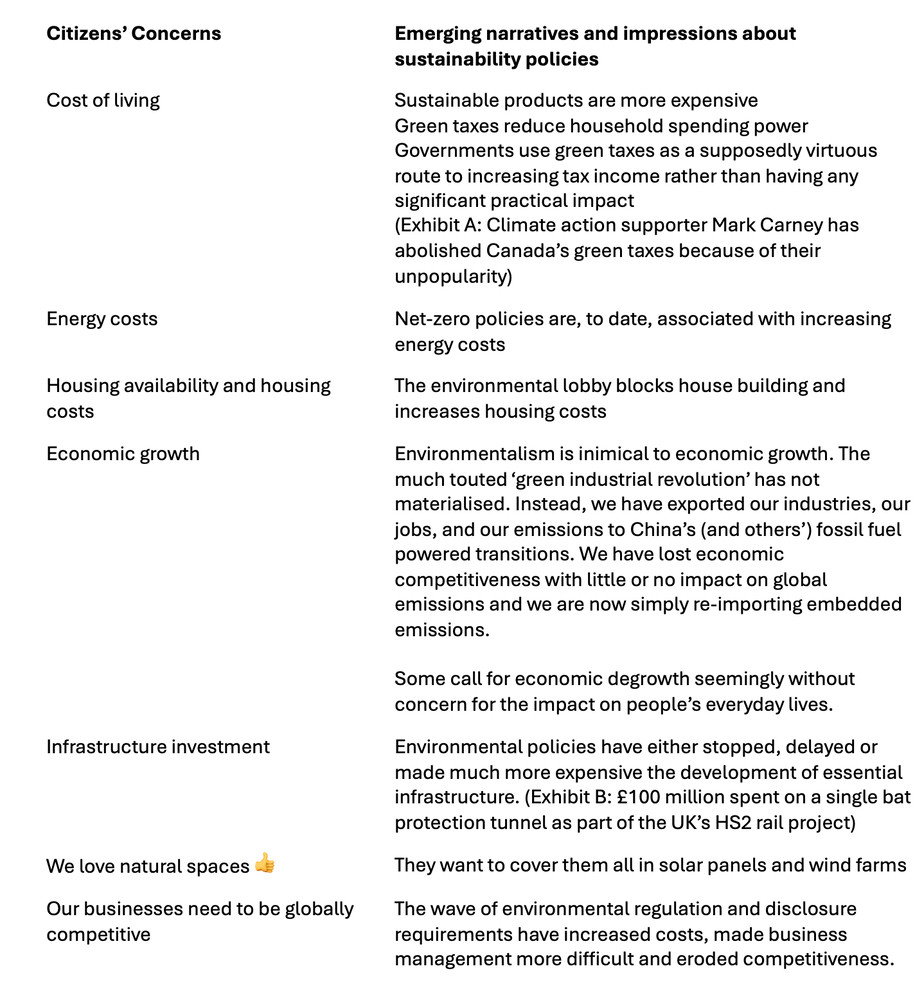The fundamental framework needs to change. Instead of asking ‘how do we push forward the sustainability agenda?’ we need to be asking ‘what contribution can a sustainability approach make to meeting people’s everyday concerns?’
A backlash to the sustainability, ESG, climate, environmental – call it what you will – agenda seems to be in full swing. It has many in the environmental and sustainability movement concerned – to put it mildly.
Neither is the backlash confined to Trump’s ideologically based anti-environmentalism. It is more widespread than that – both geographically and in terms of the response by citizens and voters. As a result, environmental concerns are rapidly slipping down the list of political priorities.
The emerging narrative is that we’ve overdone it – to the detriment of economic performance and people’s quality of life.
The good news
Let’s start with the good news. Every policy area that gains significant momentum can, and should, expect a backlash to emerge. All policies have winners and losers and eventually the losers mobilise. This is normal – and possibly welcome.
Think of it in the same way as stock market corrections following a period of exuberance. It sorts out the wheat from the chaff, corrects unsustainable over-reach, and introduces more seriousness and realism into the debate.
That there is a backlash is evidence that the sustainability agenda has, over the last several years, gained significant traction. That is a great success that needs to be celebrated.
Progress does not proceed in a nice and neat straight line. It tacks this way and that depending on the prevailing political winds. That such tacking is now necessary should not, therefore, be a cause for concern. It is an opportunity for some deeper thought and for developing approaches that have greater long-term robustness.
What will not work is anger, frustration and the mere doubling down on old narratives that have become stale and no longer resonate. The temptation to do that is substantial since many are fully convinced that their narratives are not only ‘right’, but that they are immutable; opposing them is a clear sign of moral turpitude and shameless short-term self-interest.
As Keynes put it “The difficulty lies not so much in developing new ideas as in escaping from old ones.”
Where we’re at
The narrative that is emerging (and narratives matter – maybe more than erudite analyses) is that the sustainability agenda is inimical to citizens’ main everyday concerns. Here are some examples of such impressions:

I put these statements up neither to support them nor to condemn them. As always, all impressions have elements of truth if, maybe, not the whole truth.
Neither are such impressions going to be changed by yet more publication of erudite studies. Or by frustrated calls that they are all incorrect and people just need to be ‘educated’. Or by yet more predictions of existential catastrophe (that has been tried I believe). Or by saying to people that pain today will be well worth it for jam to come pasado mañana. Those having difficulty putting food on the table today have little focus on what might or might not happen in twenty or fifty years’ time.
Developing a multi-coloured lens
With regards to what we have come to call ‘environmental policy’ I have written previously that “despite the focus of activists, these are not ‘environmental questions. They are questions about the whole basis of our political economy…One starting point is to stop labelling these issues as ‘environmental’ issues and putting them in their own box, separate from the rest of our political and economic concerns.”
In a report addressing the issue of fossil fuel subsidies, we wrote: “Much work in the environmental field is technically detailed and highly sophisticated. Where improvement would be helpful is in looking at the issues through a broader set of lenses, integrating the demands of other, overlapping policy areas that may pull in opposite directions, and focusing on how suggested initiatives can be shown to improve voters’ lives in the short term as well as benefiting future generations.”
In other words, it is time to make a fundamental shift. We need to stop looking at issues exclusively through the green lens of ‘environmental policy’ and start looking at them through a multicoloured lens that recognises the deep interaction between environmental concerns and other areas of policy.
As written above, the focus needs to change to the contribution that a sustainability approach makes to meeting people’s everyday concerns.
While this is easy to say, it will be difficult to achieve as it is counter-cultural to a belief system built over decades. The most committed activists will likely have no truck with such an approach.
Even those who try find it challenging. In recent discussions with groups focused on developing new approaches, the stickiness of coming at things from an environmental and sustainability policy perspective is obvious – despite honest efforts to shift the perspective.
It’s hard, maybe vindicating Samuel Johnson’s statement that “The chains of habit are too weak to be felt until they are too strong to be broken.”
A new environmentalism?
Let us not underestimate the challenge put before us as there is increasing questioning of the sustainability agenda. It’s a challenge we should welcome. It is an opportunity to re-imagine a new environmentalism that resonates more broadly. That extends the circle of support as people see both short-term and long-term benefits to themselves, their families, their communities, their country and the planetary health essential to our wellbeing. And it can’t just be the last of those standing alone.
There are some highly successful initiatives that have already achieved these things and from which we can learn. They remain far too few and far between.
The sustainability agenda is not going away. It’s too important and too deeply embedded. What we need to internalise is that continued success, and the pace of change, do not depend on others. They depend largely, and almost exclusively, on an effective evolution of the environmental movement to make itself fit for the political times in which we live.
This blog was originally posted in Joe’s Random Thoughts newsletter on Linkedin.





